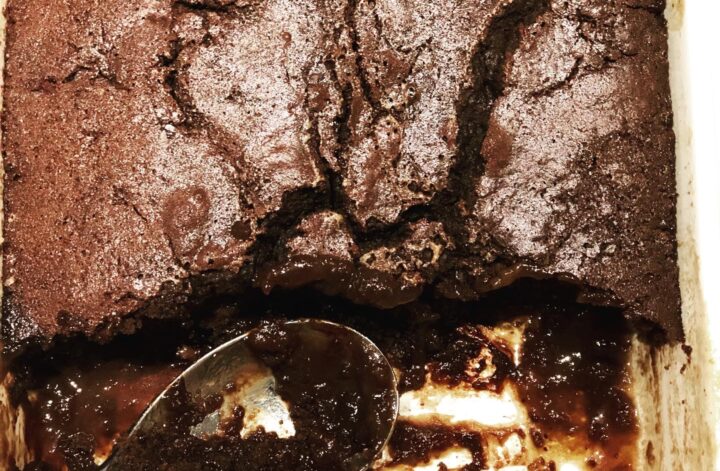This deliciously rich pudding makes it’s own gooey sauce as it cooks. It’s one of those strange self-saucing bakes where you pour the sauce over the top of the cake batter, before baking. Then the layers swap over in the oven. We call it an ‘impossible pudding’ in our house.
Prepare: 15 minutes
Cook: 30 minutes
Serves: 8
100g butter , melted, plus extra for greasing
250g self-raising flour
140g caster sugar
75g cocoa
1 tsp baking powder
1 large orange, finely grated zest and juice
3 medium eggs
150ml milk
100g orange dark or milk chocolate, broken into pieces (I used Lindt orange milk chocolate)
200g light soft brown sugar
- Preheat the oven to 180C, gas mark 4 and grease a 2 litre ovenproof baking dish with a little butter. Put the flour, caster sugar, 50g of the cocoa, baking powder, orange zest and a pinch of sea salt flakes in a large mixing bowl.
- Whisk the orange juice, eggs, melted butter and milk together, then gradually pour this onto the dry ingredients, whisking throughout, until smooth. Stir in the chocolate pieces. Spoon the mixture into the baking dish.
- Mix 300ml freshly-boiled water with the soft brown sugar and remaining 25g cocoa. Pour this all over the pudding batter – don’t worry, it will look really odd and unappetising at this stage!
- Bake for 30 minutes, until the surface looks firm and risen. Spoon into serving bowls, together with the rich, glossy sauce beneath. Eat immediately with cream, custard or vanilla ice cream.
Top tip: If you don’t like chocolate and orange together, just leave out the fruit (adding a little extra milk to loosen the sponge) and use plain dark or milk chocolate instead.
You can even do this in a slow cooker: Remove and grease the slow cooker pot. Follow steps 1 and 2 above, then spoon the mixture into the slow cooker pot. Mix 275-285ml (1/2 pint) freshly-boiled water with the soft brown sugar and remaining 25g cocoa then pour this over the batter. Return the pot to the slow cooker base, cover and cook on high for 3 hours, until firm and risen.

